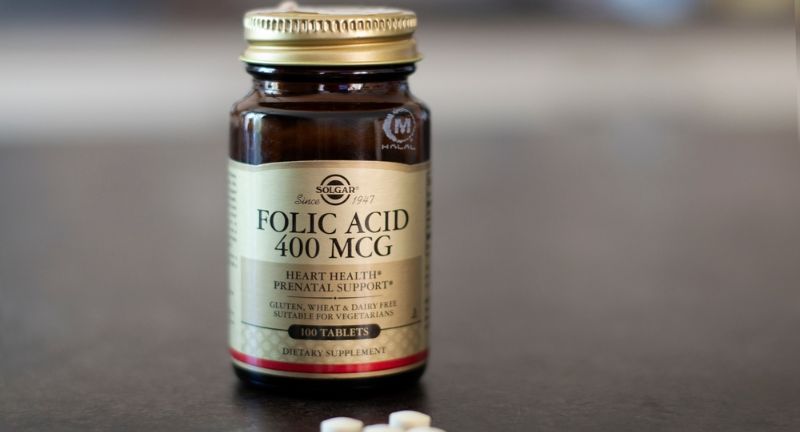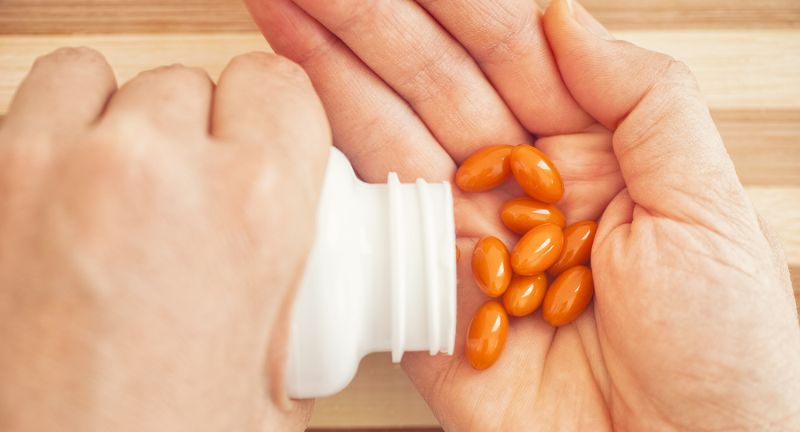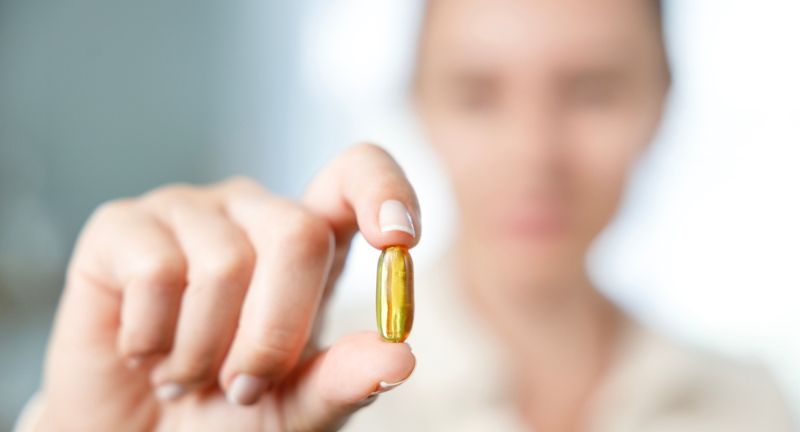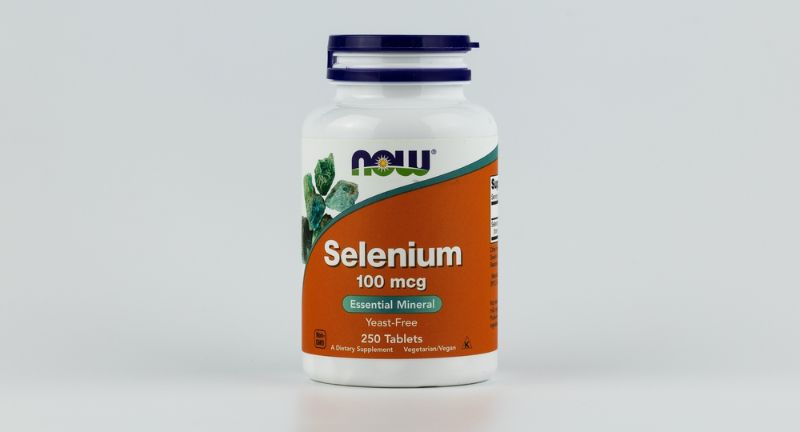HEALTH + FITNESS
25 Supplements to Help You Stay Strong and Healthy After 50
Published
1 month agoon

Shutterstock
As we age, our bodies undergo various changes that can impact overall health and wellness. After the age of 50, maintaining optimal levels of essential nutrients becomes increasingly important for supporting bone health, cognitive function, energy, and more. While a balanced diet is crucial, certain supplements can help fill nutritional gaps and address age-related concerns. From boosting immune defenses to protecting heart and brain health, the right supplements can make a significant difference. This guide explores 25 supplements to consider for staying healthy and vibrant well into your golden years.
Calcium

Shutterstock
Calcium is essential for maintaining strong bones and teeth, especially as you age. It plays a key role in preventing osteoporosis, a condition that weakens bones and increases the risk of fractures. Beyond bone health, calcium supports muscle contractions, nerve function, and blood clotting. If your diet lacks calcium-rich foods like dairy or leafy greens, a supplement can help bridge the gap.
Vitamin D

Shutterstock
Vitamin D is crucial for absorbing calcium and maintaining bone density, which becomes increasingly important after 50. It also plays a role in boosting the immune system and reducing inflammation. Sunlight is a natural source of vitamin D, but many people don’t get enough exposure. A supplement can ensure you’re meeting your daily needs and supporting your overall health.
Magnesium

Shutterstock
Magnesium is a vital mineral that supports over 300 biochemical reactions in the body. It aids in muscle function, regulates blood pressure, and supports bone health. As magnesium levels often decline with age, supplementation can be beneficial. Including this mineral in your regimen helps maintain overall health and reduce the risk of age-related issues like heart disease and muscle cramps.
Omega-3 Fatty Acids

Shutterstock
Omega-3 fatty acids are known for their powerful anti-inflammatory properties and their ability to support heart health. They also benefit brain function, which is critical as cognitive health can decline with age. Found in fatty fish and supplements like fish oil, omega-3s can also ease joint stiffness. Adding this supplement to your routine helps you maintain a healthier heart and sharper mind.
Probiotics

Shutterstock
Probiotics are beneficial bacteria that support a healthy digestive system and improve gut health. They can enhance nutrient absorption and strengthen your immune system, which can weaken as you age. Probiotics may also help prevent common digestive issues like constipation or bloating. Incorporating them into your diet or taking supplements can help promote a balanced and thriving gut microbiome.
Folate (Folic Acid)

Shutterstock
Folate, or folic acid in supplement form, is vital for cell production and DNA repair. It plays a crucial role in heart health by reducing homocysteine levels, which can be linked to cardiovascular disease. For individuals over 50, maintaining adequate folate levels can help prevent certain age-related conditions. Including this supplement can also support brain function and overall well-being.
Coenzyme Q10 (CoQ10)

Shutterstock
Coenzyme Q10 is a powerful antioxidant that helps generate energy in your cells. As levels naturally decline with age, supplementation can support heart health and combat fatigue. CoQ10 may also be beneficial for individuals taking statins, as these medications can reduce natural CoQ10 levels. By adding this supplement, you can boost energy levels and support cardiovascular function.
Collagen

Shutterstock
Collagen is a protein that supports skin elasticity, joint health, and overall structural integrity of tissues. As collagen production decreases with age, skin may lose firmness, and joints may become stiffer. Supplementing with collagen can help counteract these effects, promoting a more youthful appearance and improved mobility. It also supports healthy hair and nails, making it a popular choice for those over 50.
Zinc

Shutterstock
Zinc is a trace mineral that plays a significant role in immune system function and wound healing. As you age, zinc deficiency can become more common, potentially leading to a weakened immune response. Supplementing with zinc can help your body fight infections and recover from illnesses more efficiently. It also supports taste and smell, senses that may diminish with age.
Iron

Shutterstock
Iron is critical for producing hemoglobin, which carries oxygen in the blood. While iron needs decrease for some people over 50, deficiencies can still occur, leading to fatigue and anemia. It’s essential to only supplement if needed, as too much iron can be harmful. Consulting with a healthcare provider can help determine if an iron supplement is right for you.
Potassium

Shutterstock
Potassium is vital for maintaining healthy blood pressure, muscle function, and nerve signaling. As you age, potassium intake becomes increasingly important for heart health. Low levels of potassium can lead to muscle weakness and an irregular heartbeat. Including potassium-rich foods or supplements in your diet can help keep your body functioning optimally.
Vitamin E

Shutterstock
Vitamin E is a powerful antioxidant that protects cells from damage caused by free radicals. It plays a vital role in supporting skin health, helping to maintain a youthful appearance. Additionally, vitamin E supports immune function and can help prevent age-related vision problems. Including it in your supplement routine may promote overall health and protect against oxidative stress.
Vitamin C

Shutterstock
Vitamin C is essential for immune system support and aids in collagen production, keeping your skin and connective tissues healthy. Its antioxidant properties help combat oxidative stress and may reduce the risk of chronic diseases. For those over 50, vitamin C can play a role in improving heart health and maintaining a strong immune defense. Supplementing with vitamin C ensures your body gets the support it needs, especially during cold and flu season.
Turmeric (Curcumin)

Shutterstock
Turmeric contains curcumin, a compound known for its anti-inflammatory and antioxidant properties. It can help alleviate joint pain and stiffness, making it an excellent supplement for those with arthritis or age-related joint concerns. Additionally, curcumin may support brain health and reduce the risk of cognitive decline. Adding turmeric supplements to your regimen can enhance overall health and well-being.
Resveratrol

Shutterstock
Resveratrol, a compound found in red wine and certain berries, is known for its anti-aging and heart health benefits. It may help lower blood pressure, improve cholesterol levels, and protect brain function. Resveratrol is also an antioxidant, combating oxidative stress that can accelerate aging. Supplementing with resveratrol can be an easy way to harness these benefits without consuming excessive alcohol.
Lutein and Zeaxanthin

Shutterstock
Lutein and zeaxanthin are carotenoids that play a crucial role in maintaining eye health. They help filter harmful blue light and reduce the risk of age-related macular degeneration, a common concern after 50. These nutrients are found in leafy greens but can be taken as supplements for additional support. Keeping your vision sharp and healthy becomes more manageable with these powerful antioxidants.
Iodine

Shutterstock
Iodine is essential for proper thyroid function, which regulates metabolism and energy levels. As thyroid issues become more common with age, maintaining adequate iodine levels is critical. Deficiency can lead to symptoms like fatigue, weight gain, and hair thinning. A supplement can help support thyroid health and ensure your body’s systems are functioning optimally.
Selenium

Shutterstock
Selenium is a trace mineral with potent antioxidant properties that protect cells from damage. It supports thyroid health and helps combat oxidative stress, which can lead to chronic diseases. Selenium is also known for its role in boosting the immune system and promoting healthy skin and hair. A supplement can ensure you’re meeting your daily selenium needs, especially if your diet lacks selenium-rich foods like nuts and fish.
Melatonin

Shutterstock
Melatonin is a hormone that regulates sleep-wake cycles, which can become disrupted with age. For individuals over 50, insomnia or difficulty staying asleep can become more frequent. Melatonin supplements can help improve sleep quality and establish a more regular sleep pattern. By supporting restful sleep, melatonin also aids in overall mental and physical recovery.
Ginkgo Biloba

Shutterstock
Ginkgo biloba is a popular herbal supplement known for enhancing cognitive function and memory. It improves blood circulation to the brain, which may help prevent age-related cognitive decline. Ginkgo biloba is also believed to reduce symptoms of anxiety and improve focus. Adding this supplement to your routine can support mental clarity and overall brain health.
Fiber Supplements

Shutterstock
Fiber is essential for digestive health, and meeting your daily fiber needs can become challenging with age. Fiber supplements help maintain regularity and promote a healthy gut microbiome. They can also aid in managing cholesterol levels and controlling blood sugar. Supplementing with fiber ensures your digestive system functions smoothly, especially if your diet lacks sufficient fiber-rich foods.
Ashwagandha

Shutterstock
Ashwagandha is an adaptogen that helps the body manage stress and reduce cortisol levels. It’s particularly beneficial for those over 50, as it supports energy levels and may improve sleep quality. Additionally, ashwagandha is known to enhance cognitive function and promote mental clarity. This herbal supplement can be a valuable addition to your routine for overall vitality and stress management.
Biotin

Shutterstock
Biotin, also known as vitamin B7, is essential for maintaining healthy hair, skin, and nails. As these areas may become more brittle or dull with age, biotin can provide much-needed support. It also plays a role in energy production and metabolism. Adding biotin to your supplement regimen can help you maintain a youthful appearance and overall vitality.
Multivitamin

Shutterstock
A multivitamin is a convenient way to ensure you’re meeting your daily nutritional needs as dietary gaps become more common with age. It typically contains a blend of essential vitamins and minerals to support overall health. Multivitamins can help boost energy levels, enhance immune function, and support bone health. Taking a multivitamin tailored for individuals over 50 can simplify your supplement routine and promote overall well-being.
Conclusion

Shutterstock
Reaching the age of 50 is a milestone that brings new opportunities to focus on your health and well-being. Incorporating the right supplements into your routine can help support your body as it navigates the natural changes that come with aging. From stronger bones to a sharper mind, these supplements offer targeted benefits that can enhance your quality of life. Always consult with a healthcare professional before starting any new supplement to ensure it’s right for your specific needs. By making thoughtful choices now, you can set the foundation for a healthier and more vibrant future.
Related Topics:

More From Lifestylogy
-


31 Reasons Why Headphones Are Bad For You
-


Restaurant Chain Checking Customers Temperatures Amid COVID-19 Fears
-


25 Reasons Why 10,000 Steps A Day Will Change Your…
-


Chris Hemsworth Shares Photos of Insane Weight Loss for Upcoming…
-


Former MTV Veejay Opens Up About Breast Cancer Diagnosis
-


Sunscreen 101 – What You Need to Know This Summer
-


New Study Links Lack of Vitamin D with Dementia Risk
-


Gerard Butler Hospitalized
-


The CDC Issues Guidelines for Halloween and Thanksgiving